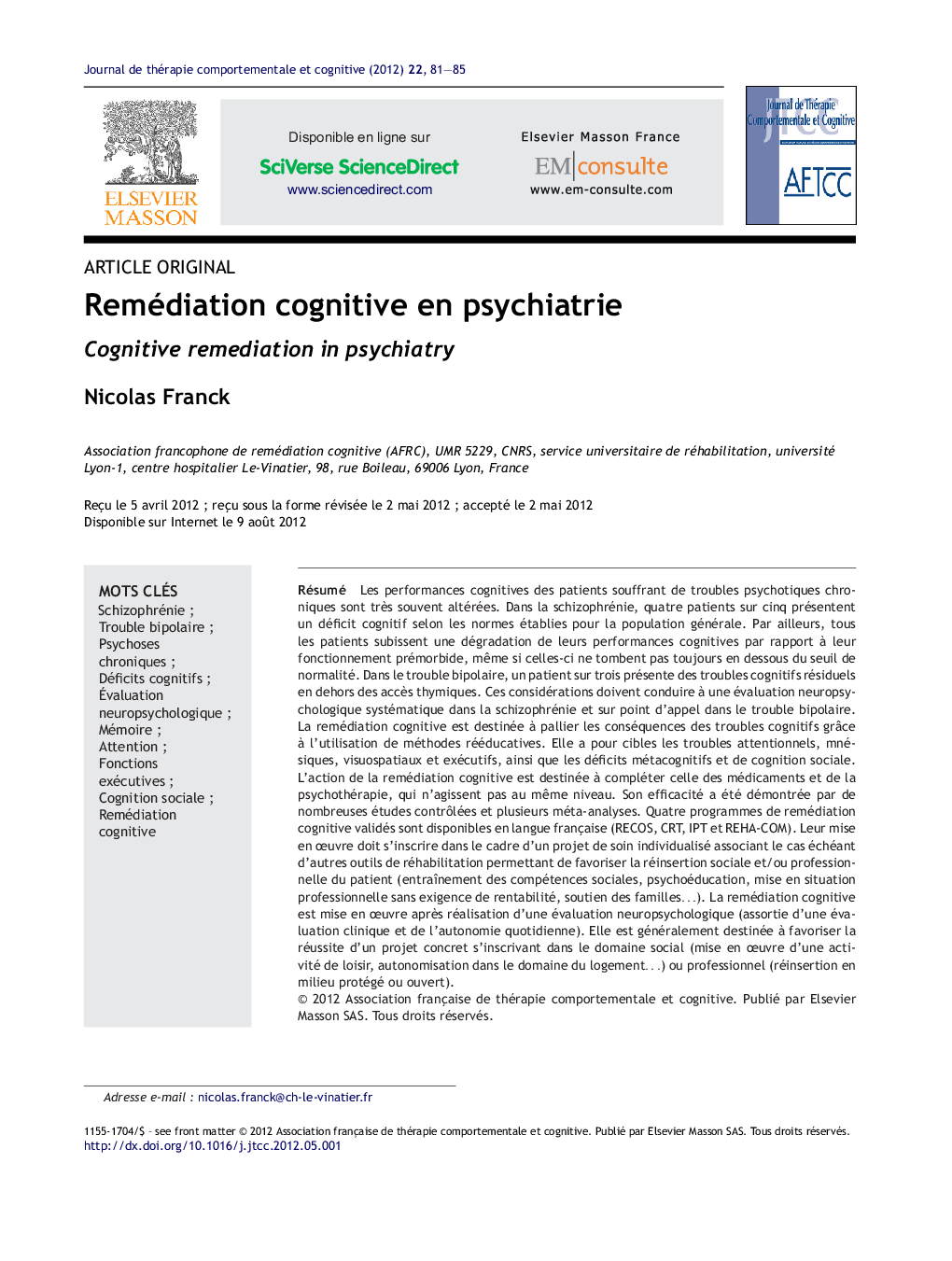| کد مقاله | کد نشریه | سال انتشار | مقاله انگلیسی | نسخه تمام متن |
|---|---|---|---|---|
| 934662 | 923685 | 2012 | 5 صفحه PDF | دانلود رایگان |
عنوان انگلیسی مقاله ISI
Remédiation cognitive en psychiatrie
دانلود مقاله + سفارش ترجمه
دانلود مقاله ISI انگلیسی
رایگان برای ایرانیان
کلمات کلیدی
Fonctions exécutives - اجرایی اجراییbipolar disorder - اختلال دو قطبیTrouble bipolaire - اختلال دوقطبیcognitive impairment - اختلال شناختیAttention disorders - اختلالات توجهÉvaluation neuropsychologique - ارزیابی عصب شناختیNeuropsychological assessment - ارزیابی عصب شناختیSchizophrenia - اسکیزوفرنی یا شیزوفرنیRemédiation cognitive - اصلاح شناختیCognitive rehabilitation - توانبخشی شناختیAttention - توجهSchizophrénie - جنون جوانیMémoire - حافظهMemory - حافظهCognition sociale - شناخت اجتماعیSocial cognition - شناخت اجتماعیDéficits cognitifs - نقص شناختیExecutive functions - کارکردهای اجرایی
موضوعات مرتبط
علوم پزشکی و سلامت
پزشکی و دندانپزشکی
روانپزشکی و بهداشت روانی
پیش نمایش صفحه اول مقاله

چکیده انگلیسی
Cognitive disorders (memory, attention, executive functions, metacognition and social cognition disorders) are frequently associated with chronic psychoses particularly schizophrenia. These cognitive disorders greatly compromise the ability of afflicted patients to care for themselves and also significantly affect their social functioning. Furthermore, they manifest with the first psychotic episode. While these symptoms are not as obvious as the defining psychotic symptoms (e.g., hallucinations and delusions), their behavioral consequences can be just as detrimental. Social interactions, work, and leisure activities can all involve basic cognitive activities such as repeating a phone number, integrating interlocutor speech, or organizing one's own behavior towards defined goals; all the while having to take context into account. The persistence of criticizing delusions or stabilization of verbal hallucinations through treatment are frequently less incapacitating than even moderate cognitive dysfunction. The nature of the cognitive deficit, as revealed by the neuropsychological assessment, can identify the type of functional impairment in a given patient. Deficits in attention and working memory can result in an alteration of occupational functioning. Executive function disorders have an impact on behavior in relationships. Processing speed, attention span and working memory all have an impact on social skills. Cognitive impairment is not necessarily directly linked to functional disability, yet its effects may mediated by other variables such as a patient's ability to manage a variety of tasks: daily life, social skills, social cognition performances, symptoms, intrinsic motivation and metacognition. Although functional disability is greater for schizophrenia than for bipolar disorder, cognitive impairments are predictive of overall disability for both disorders. Antipsychotics have little beneficial effect on cognitive disorders. While they certainly can alleviate secondary cognitive deficits (e.g., attention disorder resulting from an intense hallucinatory activity), they may also generate iatrogenic cognitive impairments. Cognitive side effects are even more consequential given that antipsychotics are not systematically prescribed with the minimum effective dose; cognitive side effects may be present even in low dosage of antipsychotics when the drug has additional antihistamine or anticholergentic effects. Iatrogenic effects can be aggravated if an antiparkinsonian or a benzodiazepine corrector is associated because of their adverse effects on attention and, additionally, adverse effects on memory abilities for drugs with anticholinergic or GABAergic action. Cognitive remediation was developed to reduce the cognitive deficits or compensate for their consequences by developing alternative skills. The goal of cognitive remediation is concrete intending to promote a professional or social reintegration focusing on an intermediate variable that constitutes itself cognitive performance. To achieve this goal, cognitive remediation targets attention, memory, language and executive processes, as well as social cognition disorders. Improving performances in these areas appears to have a positive impact on functional deficits that affect daily life. Cognitive remediation is not an alternative to psychotropic treatments and/or psychotherapy, but is intended to supplement their effects. These three methods of treatment act at different levels. In practice, cognitive remediation provides an improvement in cognitive functioning, either directly by retraining the impaired functions, or indirectly through the functions developed in order to compensate. Taking into account the patient's vulnerability aids in reducing his handicap and encouraging recovery, through validation of the various situations he or she faces in daily life. Cognitive remediation is an essential therapeutic tool that can promote psychosocial rehabilitation in a patient with chronic psychotic disorder. Ideally it should be associated with other rehabilitating tools, like social skills training, psychoeducation, role playing (using a non-threatening situation), and family support. Cognitive remediation is indicated for patients whose clinical condition is stable and for whom medication is reduced to the minimum effective dose. In the ideal scenario, it is advisable to treat only the primary symptoms linked to cognitive disorders (rather than the secondary ones) or iatrogenic cognitive impairments. In some cases, the patients under care of are still symptomatic or suffering from iatrogenic cognitive effects. Should some symptoms remain under antipsychotic medication, cognitive remediation is fully justified when the benefit-risk ratio has been clearly determined. It is, however, necessary that patient condition remain stable and that some practical benefits can be attained.
ناشر
Database: Elsevier - ScienceDirect (ساینس دایرکت)
Journal: Journal de Thérapie Comportementale et Cognitive - Volume 22, Issue 3, September 2012, Pages 81-85
Journal: Journal de Thérapie Comportementale et Cognitive - Volume 22, Issue 3, September 2012, Pages 81-85
نویسندگان
Nicolas Franck,